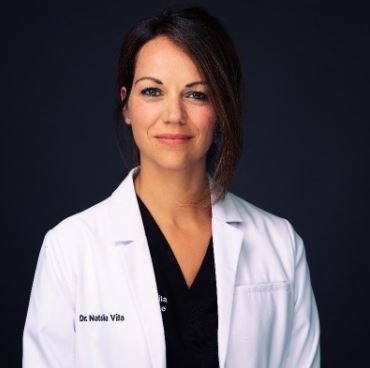Professional Experience
This section outlines clinical appointments, surgical practice, and institutional affiliations that demonstrate Dr. Vila’s practical expertise.
- Current roles: Medical and surgical retina specialist at the Montreal Retina Institute and Clinique Focale, affiliated with university hospitals.
- Clinical practice: Provides diagnosis and treatment for a wide range of retinal conditions, and performs vitreoretinal and combined cataract surgeries.
- Surgical focus: Complex retinal detachment repair, vitrectomy, silicone oil surgery, and intraocular lens fixation when capsular support is absent.
- Volume and outcomes: Actively performs retina surgeries; specific case counts and statistics are not publicly available.
- Leadership and mentorship: Participates in training of retina fellows and ophthalmology trainees through hospital and academic programs.
Academic Contributions
Dr. Vila contributes to education and research. This section highlights teaching roles, conference participation, and research interests.
- Teaching positions: Holds or has held roles as an academic lecturer and clinical educator affiliated with university programs.
- Lectures and courses: Delivers talks and training sessions at specialty meetings and courses in vitreoretinal surgery.
- Research interests: Focuses on diabetic macular edema, complex retinal detachment, endoscopy-assisted vitrectomy techniques, and IOL fixation methods.
- Mentorship: Engages in supervision and skill training for retina fellows and surgical trainees.
Areas of Expertise
This section lists clinical conditions and patient-centered examples to help patients understand what Dr. Vila treats and how those conditions affect daily life.
- Diabetic retinopathy and diabetic macular edema: Medical and surgical management to preserve or improve vision in patients with diabetes. Example for patients: treatment may prevent progressive vision loss and restore reading ability.
- Age-related macular degeneration (AMD): Management of wet AMD and its complications using injections and surgical care as required. Example for patients: treatment aims to stabilize central vision for tasks like recognizing faces.
- Retinal detachment: Vitrectomy and specialized repair techniques for detachment repair, including complex cases with scar tissue (proliferative vitreoretinopathy).
- Vitreous hemorrhage: Surgical removal of blood in the vitreous to restore vision and allow retina treatment.
- Cataract with retinal disease: Combined cataract and retina procedures when both conditions affect vision.
- IOL fixation techniques: Management of eyes lacking capsular support with scleral fixation or alternative intrascleral techniques.
Publications and Research
Selected publications and short summaries demonstrate Dr. Vila’s research contributions that are relevant to patients and clinicians.
- Switching therapy for refractory diabetic macular edema: A study reporting that switching to aflibercept in patients not responding to prior anti-VEGF treatment produced visual and anatomical improvements over one year. This finding is relevant for patients with persistent swelling despite initial injections.
- Endoscopy-assisted vitrectomy in complex retinal detachment: Research describing improved reattachment rates in select complex detachments when intraocular endoscopy is used during surgery. This work informs surgical choices for difficult cases.
- Techniques for intrascleral IOL fixation: Publications describing sutureless and self-sealing methods for securing intraocular lenses in eyes with poor capsular support. These techniques reduce certain surgical risks and can improve visual rehabilitation.
Research profiles: Dr. Vila is listed in academic and research networks with multiple contributions. Specific publication lists and external profile links are available in scientific databases and institutional directories.
Patient Care Philosophy
This section explains Dr. Vila’s approach to patient care, communication, and service to diverse patients.
- Patient-centred care: Emphasizes individualized treatment plans based on disease severity, response to therapy, and patient goals.
- Evidence-based decisions: Uses current research to guide therapy choices and surgical techniques.
- Clear communication: Prioritizes patient education so people understand their diagnosis, treatment options, and expected outcomes.
- International patients and access: Practices in academic and international settings; patients from other regions should contact the clinic for information on consultations and scheduling. Specific online pre-consultation services were not publicly confirmed.
- Cultural sensitivity and satisfaction: Works in multi-lingual clinical environments and focuses on patient safety and satisfaction.
Professional Affiliations
Professional memberships and certifications reinforce Dr. Vila’s clinical qualifications and international collaboration.
- FEBO: Fellow of the European Board of Ophthalmology, indicating advanced recognition in ophthalmology.
- Memberships: Member of international retina and ophthalmology societies and professional networks.
- Academic affiliations: Associated with university hospitals as a clinical lecturer and staff specialist.
- Licenses and certifications: Holds required medical licensure and specialty certification for clinical practice (specific license numbers and boards are not publicly listed here).
FAQs
- Is Dr. Natalia Vila board-certified?
- Yes. She holds FEBO (Fellow of the European Board of Ophthalmology), which denotes advanced specialty assessment and recognition.
- What types of surgeries does she perform?
- She performs vitrectomy, retinal detachment repair (including complex cases), silicone oil removal, combined cataract and retina surgery, and intraocular lens fixation for eyes with inadequate capsular support.
- Does she treat international patients?
- Dr. Vila works in academic and internationally oriented clinical environments. Patients from outside the country should contact the clinic directly to arrange referrals, visits, or possible remote pre-consultation options. Specific online services were not publicly confirmed.
- How long is the typical hospital stay after retina surgery?
- Many retina procedures are performed as day surgery. Complex cases or combined procedures may require overnight observation. The exact duration depends on the procedure and the clinic’s protocol.
- What languages does she speak?
- Specific public information about language fluency is limited. Given her practice locations, she is likely proficient in English and prevalent local languages. Patients should confirm language services when booking an appointment.
- How should I prepare for a consultation?
- Bring a complete medical history, a list of current medications, prior eye reports and imaging if available, and any referral letters. Expect a comprehensive eye exam and discussion of treatment options.
- Where can I find her publications?
- Selected publications and research contributions are listed in academic databases and research networks. Search professional research platforms and institutional profiles for indexed articles and summaries.






